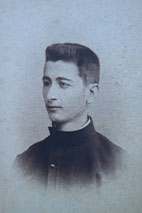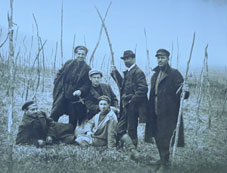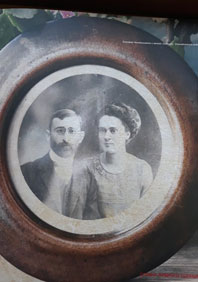
Solomon Cholokashvili - Country of Liquid Sun
Wednesday, April 29
The year was approximately 1936. An interesting idea appeared to the First Secretary of the Republic, Lavrenti Beria - the Republic of Georgia has to satisfy its demand for wheat… The scientific justification of - this "brilliant" idea was entrusted to relevant specialists of the time who found arguments for this idea and suggested solutions rooting out the vineyards and orchards and seeding wheat in their places. Afterward, a meeting was held, headed by Beria himself.
The speakers after speakers in attendance delightedly supported the presenter's Idea speakers as they were well aware that the idea did not belonged to them but to Beria himself. Suddenly, amongst the chorus of glory and approval, someone exclaimed in the hall. "Everything is nonsense, mere nonsense!" The room was silent. Beria looked over the people furiously. The glasses of his pince-nez flashed with evil. "Кто сказал?!" (Who said it?!) - he asked (he always conducted meetings in Russian). "Я сказал!" (I did!) - a slight, not very tall man, clothed in the European style, rose from his place. It was the Chair Director of the Department of Viticulture and Wine Making, the founder of the scientific centre of this field in Georgia, Professor Solomon Cholokashvili, "Выходи!" (Come out!) - ordered Beria briefly and strictly. Cholokashvili came out and proved with scientific accuracy and unarguable logic that the raising of the level of yields according to the proposed speaker's method was non-scientific, non-profitable and harmful for Georgia. Beria listened without uttering a word and when Cholokashvili finished, he looked over the room again: "Что скажут специалисты-полеводы, где Ломоури?" (What would specialists-field crop growers say, where is Lomouri?) Iulon Lomouri, the main field crop grower and Director of the Department of the Crop Production Department of the Agricultural Institute, stood up, crawled to the tribune and when he ascended he cheered up and said: "I fully agree.. (here he paused and then finished) ... with all of the arguments of Professor Cholokashvili!" After these words, he proved the absurdity of the proposed plan from a scientific point of view. At the same time, he could not restrain from, so to say, making a prohibited trick. He approached Beria: "Lavrenti Pavlovich, some apologies for specialists have misled you! Their idea (he stressed the word "their") is unjustified due to their lack of competence and aspiration to false fame. After this, Beria stopped the discussion. He grumbled: "The issue wasn't well prepared" and he closed the meeting. People, who stood up, did not look at Cholokashvili and Lomouri to see when they were going to the exit but they made their way, not as a sign of respect, but because of fear. The only person, who openly approached and shook hands with them, was Giorgi Rtskhiladze, a modest and quiet figure and a very honest and person of principals. These three men walked out of the meeting hall together…
Like other meeting participants, Solomon Cholokashvili, Giorgi Rtskhiladze and Iulon Lomouri expected to be arrested the same night and, further, there were all of the pre-conditions for it: Solomon Cholokashvili was a Prince who was educated abroad, lulon Lomouri was a former Social-Democrat, an official representative of the Menshevist Party in Germany and a participant in battles against the Red Army and Giorgi Rtskhiladze himself also a participant in the struggles opposing the Red Army. After that fact, each of them had a small suitcase packed in expectation of their arrest... but none of them was arrested and no one knows why. Sometimes, such "unexplained" actions were characteristic for Beria.
One of the main participants of this event, Solomon Cholokashvili, was the initiator of the formation of viticulture and wine making as a scientific branch of studies in Georgia. The knowledge and traditions in this field passed from generation to generation over centuries with fathers the knowledge that obtained from their ancestors to their children whilst teaching them to love the vines and telling them the rules and secrets of taking good care. The mass spreading of vine-related diseases in the twentieth century did great harm to Georgian viticulture. The implementation of modern methods for fighting against the diseases became necessary. One of the initiators in this field was the famous scientist and dedicated specialist and professional of his field, Solomon Cholokashvili.
Solomon Cholokashvili was born in 1883 in the village of Bakurtsikhe of in the region of Gurjaani. He received a primary education in his family and then was taken to the Tbilisi Gymnasium. Upon his parents’ decision, Cholokashvili continued his studies in the Crimea at Nikitin's Gardening-Viticulture School. His father, Mikheil Cholokashvili, taught him the love of the vine. In 1904, however, Cholokashvili was expelled from the School due to revolutionist activities after which he continued his studies in Austria, at the Closterneuburg Viticulture, Fruit Growing and Decorative Gardening Institute, located near Vienna. In 1907, he graduated with honours from the Viticulture-Wine Making Department and continued his scientific and practical activities at the same Institute.
In 1908, Cholokashvili returned to Georgia and became actively involved in agricultural activities. It was the time when phylloxera did immeasurable harm to Georgian vineyards. On his initiative, a young vine plant farm was established in Kaspi, in the village Agayani. The tireless work and dedication of the young specialist brought results with viticulture slowly but surely following the way of revival. In 1912, Cholokashvili published an extensive work entitled Phylloxera and the Fight Against It. The publication was a very timely one and greatly helped those engaged in viticulture at that time. In 1919-1923, he taught a viticulture course at Higher Agricultural Courses. Beginning in 1920, he conducted lectures in viticulture at Tbilisi State University (1920) and the Agronomic Department of the Polytechnic Institute and published a Viticulture textbook (in 1923). Cholokashvili's long and diligent work, so fundamental in Georgian viticulture and consisting of five volumes, was prepared for publication but only three volumes were printed. In 1923, the Scientific Board of the Polytechnic Institute elected him as a docent and, in 1926, awarded him the title of professor. In 1925, upon the decision of the Scientific Board of Tbilisi State University and the Polytechnic Institute, Cholokashvili was sent abroad on a scientific assignment for the period of a year-and-a- half. He worked in Germany, at Heizenheim, with Professor Cramer and in France, at Montpelier University, with the academician, Ravaz. During his work abroad, he became fundamentally acquainted with the activities of leading research institutions and famous winegrowing regions in France, Germany, Italy, Hungary and Austria.
Upon his return to his native country from the assignment, Cholokashvili continued his scientific, educational and practical activities with his Inherent energy and enthusiasm. In parallel, he began preparations for the establishment of a scientific research institute of viticulture and wine making. In 1931, his initiative and efforts resulted in the establishment of the Union-Wide Scientific Research Institute of Viticulture and Wine Making in Tbilisi which directed and led scientific activities in the sector in the relevant republics of the Soviet Union of the time. His work was supported by such famous scientists as Modebadze, Gerasimov, Negrul, Sergeev, Printse, Shatsky, Sanikidze, Geintz, Meliavsky and others. In 1935, Cholokashvili quit working at the Scientific Research Institute and devoted all of his time and energy to the Department of Viticulture which he established at the Agricultural Institute. He directed this Department for 24 years as well as continuing his scientific activities.
In connection with the establishment of the Agricultural Department at the Academy of Sciences of Georgia, Solomon Cholokashvili was elected as a Full Member of the Academy. In the last years of his life, he was the member of Editors' Board of USSR Ampelography. Whilst working at the Scientific Research Institute of Viticulture and Wine Making and at the Agricultural Institute, he gathered together a whole generation of talented and diligent young people and created a famous school of Georgian viticulture scientists such as: Valerian Kantaria, Maksime Ramishvili, Nadezhda Chakhnashvili, Dimitri Tabidze, Aleksandre Khelashvili, Natasha Makharadze and Ketevan Gegeshidze, amongst others. The Scientific Research Institute of Gardening, Viticulture and Wine Making and the Viticulture Department of the Agricultural Institute, alongside the diligent activities of those scientists working there, conditioned the success of Georgian wine making in the twentieth century.
Idea generators and implementers create an epoch which brings good to society: such people stay in the shadow but establish a special place in history. Due to patriotism, passion for his profession and care for future generations, Solomon Cholokashvili truly occupied a remarkable place in the history of Georgian viticulture.





